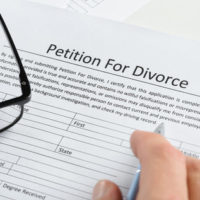When Death and Divorce Collide

Filing for divorce throws the financial and personal affairs of many couples into flux. Deciding who will have access to bank accounts and live in the family home are issues that must be addressed quickly, but may not be easily resolved. Despite the contentiousness of a divorce, both parties assume the desired outcome will occur – the court will legally dissolve their marriage. Divorce settles the critical issues of child support, property division and child custody by factoring in the rights and circumstances of both parties. However, all of these plans and legal processes are completely disrupted if a spouse dies while the divorce is pending. Courts will rarely, if ever, grant a divorce in this situation, and the disposition of property is instead typically handled by trust and estate law. Thus, individuals planning to divorce should review and understand how the death of a spouse, while the divorce is pending, would impact the process of dividing the marital estate. An overview of this unusual but complicated legal situation will follow below.
What Happens to the Divorce Case?
Divorce is not the only circumstance during which a party to litigation can die, but, when this event does occur, the surviving party files a form with the court called a suggestion of death. By filing this document, the surviving party has the opportunity to substitute another party to stand in for the deceased, but, obviously, in a divorce case there is no substitute, so the court dismisses the divorce petition. The only time a court would consider allowing the case to continue is if property division was already settled. Issues of child custody and support become moot since the other party with an interest in these matters, the deceased spouse, is no longer available to pay or exercise parenting time.
Division of Assets
Typically, once a divorce is granted, the ex-spouse is automatically treated as if he/she predeceased the other spouse, so neither spouse is able to inherit under the provisions of a will nor state intestacy laws (how property is divided if no estate plan exists). However, these laws only apply if the divorce is actually completed. As a result, the surviving spouse is legally permitted to inherit any property transferred according to a will or intestacy laws. In either circumstance, the deceased’s estate would have to go through probate before any property could be distributed. An experienced estate attorney should be consulted in this instance to ensure the estate is handled appropriately. In Florida, surviving spouses are entitled to 30 percent of the estate in most cases. Further, other types of property pass outside probate (no court-supervision of the distribution), such as life insurance policies and retirement accounts. If the surviving spouse is listed as a beneficiary, he/she would take the death benefit. In practical terms, this means the surviving spouse should receive a considerably larger share of the deceased’s assets, which may offset the loss of future alimony or child support payments.
Private Agreements
The existence of pre- or post- nuptial agreements is another factor that could control the division of assets if a spouse dies before a divorce is finalized. These agreements often include provisions on how property should be disposed of in the event of the death of either spouse. Assuming the court accepts the agreement as valid and legally enforceable, the terms previously agreed to would dictate how the property of the deceased spouse will be allocated.
Seek Legal Advice
Divorce is an emotionally draining experience that can quickly overwhelm a spouse if the right divorce attorney is not looking out for his/her interests. The attorneys at Tampa’s Bubley & Bubley, P.A. law firm understand how stressful divorce is, and will work to streamline the process in hopes of reducing some of the negative effects on you. They can also help with any estate planning concerns you may have related to the end of your marriage. Contact us today to schedule a consultation.
Resources:
flcourts.org/core/fileparse.php/533/urlt/901b1.pdf
leg.state.fl.us/STATUTES/index.cfm?App_mode=Display_Statute&Search_String=&URL=0700-0799/0732/Sections/0732.2065.html



